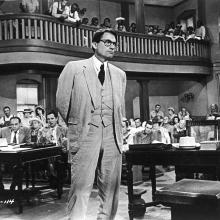Harper Lee

Harper Lee (center). Photo via RNS
Harper Lee’s “new” book Go Set a Watchman is infused with religious life and Christian moral argument, from its title to its final words.
It’s also a book with splashes of humor, enough Victorian poetry references to send readers scrambling for a Norton Anthology, and Bible allusions as the narrator of both novels, Jean Louise “Scout” Finch, grows up to own her own life.
Examples (spoiler alert!) range from small moments to an epic showdown over race, justice, and sin in which Scout’s father, the saintly Atticus Finch of Lee’s To Kill a Mockingbird, is revealed, as David Gushee writes, as a “polite racist.”
1. Read the First Chapter of Harper Lee’s ‘To Kill a Mockingbird’ Sequel
Happy Christmas in July! Read this excerpt of the much-anticipated Go Set a Watchman — due to be released on Tuesday. Or listen to the chapter, featuring narration by Reese Witherspoon, over at The Guardian.
2. Pope Apologizes for Catholic Church’s ‘Offenses’ Against Indigenous People
"I humbly ask forgiveness, not only for the offenses of the church herself, but also for crimes committed against the native peoples during the so-called conquest of America."
3. When Algorithms Discriminate
So there’s this, from the Upshot: "Research from the University of Washington found that a Google Images search for ‘C.E.O.’ produced 11 percent women, even though 27 percent of United States chief executives are women. (On a recent search, the first picture of a woman to appear, on the second page, was the C.E.O. Barbie doll.)"
September 30 - October 6 was Banned Books Week, an annual event that celebrates the freedom to read.
Surprisingly, Harper Lee's novel To Kill A Mockingbird makes the list of frequently banned books.
To Kill A Mockingbird changed my life.
"You never really understand a person until you consider things from his point of view," says Harper Lee through Atticus, "until you climb into his skin and walk around in it."
How much have I learned as a teacher and a writer by thinking about every person I meet with that consideration?
